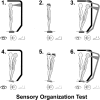Neuropsychological performance, postural stability, and symptoms after dehydration
- PMID: 17597946
- PMCID: PMC1896077
Neuropsychological performance, postural stability, and symptoms after dehydration
Abstract
Context: Dehydration and concussion are common in athletic performance. Some experts have speculated that dehydration may negatively influence performance on tests commonly used for concussion assessment.
Objective: To determine how the signs and symptoms, neuropsychological performance, and postural stability are affected by dehydration.
Design: Repeated-measures design assessing subjects in the euhydrated and dehydrated conditions.
Setting: Sports Medicine Research Laboratory.
Patients or other participants: Twenty-four healthy, male recreational athletes participated in the study.
Intervention(s): Subjects participated in 2 counterbalanced sessions (euhydrated and dehydrated) separated by at least 7 days. Subjects were dehydrated using fluid restriction and an exercise task. No direct intervention was provided for the euhydrated condition.
Main outcome measure(s): We used the Standardized Assessment of Concussion to test mental status, the Automated Neuropsychological Assessment Metrics (ANAM) to evaluate neuropsychological performance, the NeuroCom Sensory Organization Test and Balance Error Scoring System to test postural stability, the Graded Symptom Checklist to assess symptom presence and severity in our participants, and urine specific gravity and body mass to determine hydration status.
Results: No differences were noted for the Standardized Assessment of Concussion, total Balance Error Scoring System errors, composite Sensory Organization Test, and composite ANAM scores between conditions. Subjects in the dehydrated condition had significant deterioration in visual memory (t(23) = 2.130, P < .001) and fatigue measures (t(23) = -7.880, P < .001) as assessed by ANAM. The dehydrated condition resulted in subjects reporting a significantly higher number (t(23) = -8.585, P < .001) and severity (t(23) = -7.673, P < .001) of symptoms than the euhydrated subjects on the Graded Symptom Checklist.
Conclusions: Our results suggest that moderate dehydration (-2.5 +/- 0.63%) significantly influenced the self-report of symptoms commonly associated with concussion. Dehydration resulted in a deterioration of visual memory and increases in the self-report of fatigue. Despite these findings, dehydration did not affect other neuropsychological and postural stability objective testing measures for concussion.
Figures



References
-
- Derave W, De Clercq D, Bouckaert J, Pannier JL. The influence of exercise and dehydration on postural stability. Ergonomics. 1998;41:782–789. - PubMed
-
- Tomporowski PD. Effects of acute bouts of exercise on cognition. Acta Psychol (Amst) 2003;112:297–324. - PubMed
-
- Gauchard GC, Gangloff P, Vouriot A, Mallie JP, Perrin PP. Effects of exercise-induced fatigue with and without hydration on static postural control in adult human subjects. Int J Neurosci. 2002;112:1191–1206. - PubMed
-
- Szinnai G, Schachinger H, Arnaud MJ, Linder L, Keller U. Effect of water deprivation on cognitive-motor performance in healthy men and women. Am J Physiol Regul Integr Comp Physiol. 2005;289:R275–280. - PubMed
-
- Armstrong LE, Hubbard RW, Kraemer WJ, DeLuca JP, Christensen EL. Signs and symptoms of heat exhaustion during strenuous exercise. Ann Sports Med. 1987;3:182–189.
Publication types
MeSH terms
LinkOut - more resources
Full Text Sources
Medical
